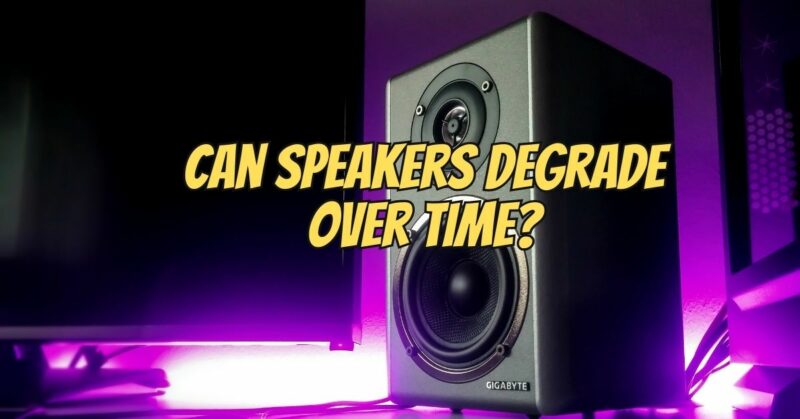Speakers can degrade over time due to a combination of factors, including usage, environmental conditions, and the quality of materials used in their construction. Here are some ways in which speakers can degrade over time:
- Component Wear: The components of a speaker, including the cone, surround, voice coil, and suspension, can experience wear and tear with use. Over time, this can lead to a reduction in performance. For example, the surround (the flexible material around the cone) can become brittle or deteriorate, affecting the speaker’s ability to move freely.
- Dust and Debris: Dust and debris can accumulate on speaker components, affecting sound quality. Dust on the diaphragm or voice coil can interfere with the movement of the cone and impact the speaker’s response.
- Moisture and Humidity: Exposure to moisture or high humidity levels can lead to damage in speakers. It can cause rust on metal components, mold or mildew growth, and deterioration of materials.
- Sunlight and Heat: Prolonged exposure to direct sunlight or excessive heat can damage speaker cones, surrounds, and other materials. It can cause materials to become brittle or degrade.
- Overpowering or Underpowering: Using an amplifier that significantly exceeds the speaker’s power handling capacity (overpowering) or one that delivers too little power (underpowering) can lead to damage over time. Overpowering can result in overheating and voice coil damage, while underpowering can cause distortion due to insufficient power.
- Age: Like any mechanical component, speakers may naturally degrade with age, even if they are not used frequently. This can result in changes to their performance characteristics, such as shifts in frequency response.
- Environmental Factors: Speakers exposed to extreme environmental conditions, such as very cold or hot temperatures, can experience accelerated degradation.
It’s important to note that the rate of degradation can vary depending on the quality of the speakers, how they are used, and the care they receive. Well-maintained speakers from reputable manufacturers may have longer lifespans and better resistance to degradation.
Regular maintenance, such as cleaning speaker components, checking for loose connections, and storing speakers in a controlled environment, can help prolong their lifespan and maintain their performance. Additionally, using amplifiers that match the speakers’ power handling specifications and practicing responsible volume control can prevent damage and degradation.


